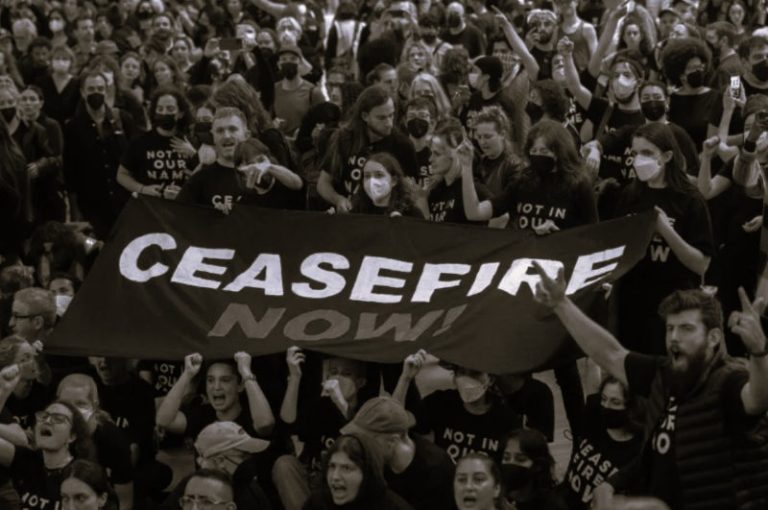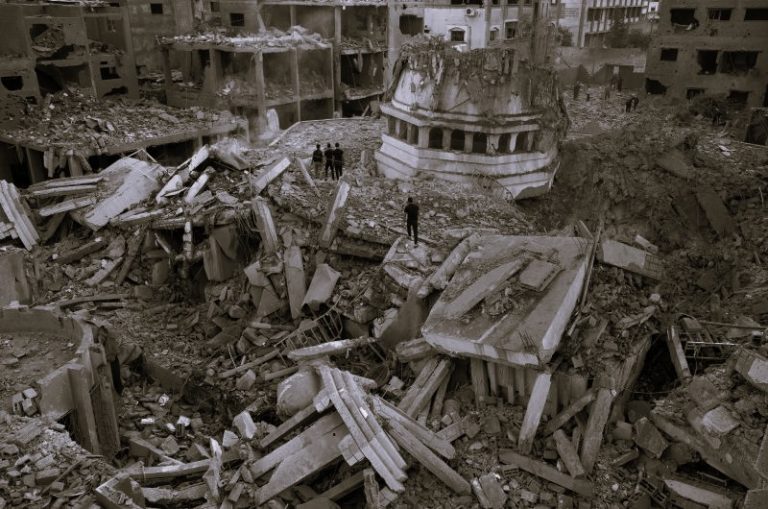

The Trump–Netanyahu alliance has fused money, arms, and politics into a machine that continues to grind Gaza into dust while eroding the guardrails of American democracy.

By Matthew A. McIntosh
Public Historian
Brewminate
Introduction
As bombs continue to fall on Gaza and international monitors warn of war crimes and even genocide, the United States under President Donald Trump has pressed forward with billions of dollars in arms and military aid to Israel. In September 2025, the administration announced plans for nearly $6 billion in new weapons sales to Israel, adding to a total of nearly $12 billion in major Foreign Military Sales approved since Trump returned to office. Earlier this year, Secretary of State Marco Rubio signed a declaration fast-tracking an additional $4 billion in military assistance, bypassing normal congressional review.
For Prime Minister Benjamin Netanyahu, facing mounting international isolation and under investigation by the International Criminal Court, Trump’s largesse has become lifeline and leverage. As the Atlantic Council observed, “for an increasingly isolated Netanyahu, it’s money time with Trump,” underscoring the political and financial stakes binding the two leaders.
The convergence of Trump’s unflinching military support and Netanyahu’s embattled hold on power has drawn sharp rebukes from human rights organizations and legal experts who argue that U.S. funding and arms transfers are enabling atrocities. The question now looming over Washington is whether America is simply Israel’s ally, or its accomplice.
Context and Background
The U.S.–Israel security relationship is one of the most entrenched in American foreign policy. The foundation was laid in 2016 with a ten-year Memorandum of Understanding committing $38 billion in aid – $33 billion in Foreign Military Financing and $5 billion for missile defense programs. Since then, U.S. support has grown into the most substantial package of military assistance ever provided to a foreign country.
According to the State Department, the Trump administration alone has approved nearly $12 billion in Foreign Military Sales to Israel, including precision-guided munitions, missile defense upgrades, and fighter aircraft. In September 2025, the administration unveiled a $6 billion weapons deal. And in March, Rubio signed a declaration to expedite $4 billion in aid, deliberately sidestepping congressional review requirements.
This acceleration of weapons deliveries has coincided with some of the most devastating military operations in Gaza’s history. Entire neighborhoods have been flattened, hospitals and schools reduced to rubble, and humanitarian agencies barred from delivering critical supplies. International organizations, including the United Nations and the International Criminal Court, have documented widespread civilian casualties and accused Israel of actions amounting to war crimes. The Guardian noted in January that Trump ordered a halt to virtually all foreign aid programs worldwide, except for Israel and Egypt, underscoring the special status of Israel within his administration’s priorities.
Meanwhile, Netanyahu has leaned heavily on Trump’s financial and political backing as he faces deepening isolation abroad. As the Atlantic Council observed, Netanyahu’s reliance on Trump reflects not only the transactional nature of their partnership but also the degree to which U.S. largesse has become vital to Israel’s ability to sustain its military campaign.
Trump’s Role: Funding, Arms, and Political Backing
Trump has positioned himself not only as Israel’s staunchest defender but also as its primary financier. His administration has authorized arms transfers at a pace and scale that far outstrip his predecessors, often brushing aside traditional oversight. The State Department’s own briefing confirms nearly $12 billion in major Foreign Military Sales since Trump returned to office, transactions ranging from precision bombs to advanced fighter jets.
In March 2025, Rubio signed a declaration to expedite $4 billion in aid, invoking emergency authority to bypass congressional review. As Reuters reported, the move sidestepped legislators who had raised concerns about Israel’s compliance with international law. This was not an isolated incident but part of a pattern. The Trump administration has repeatedly treated congressional checks as obstacles to be overcome rather than safeguards, citing “strategic necessity” to justify immediate transfers.
Politically, Trump has gone further than any U.S. leader in shielding Netanyahu from accountability. In October 2024, during a critical escalation in Gaza and Lebanon, Trump reportedly told Netanyahu, “Do what you have to do,” according to the Washington Post. The statement epitomized his approach: unconditional support for Israeli operations, regardless of humanitarian consequences.
For Netanyahu, Trump’s backing has been indispensable. Facing corruption charges and potential prosecution at the International Criminal Court, Netanyahu has leaned on U.S. aid to sustain both his military campaign and his fragile political standing. The Atlantic Council framed the relationship bluntly: “For an increasingly isolated Netanyahu, it’s money time with Trump.”
Beyond financial and military flows, Trump has deployed rhetoric to blunt legal scrutiny. He has labeled Israeli leaders “freedom fighters” and dismissed investigations into alleged war crimes as “witch hunts,” echoing his own familiar political defense strategies. The effect has been to reinforce Israel’s sense of impunity at a moment when international condemnation is intensifying.
Moral, Legal, and Political Implications
The torrent of U.S. weapons into Israel under Trump has raised profound legal and moral questions about American complicity in atrocities. Under international law, states that knowingly aid and abet violations of humanitarian norms can themselves be held responsible. The International Criminal Court’s Rome Statute defines aiding and abetting war crimes as a prosecutable offense. Human rights organizations argue that by supplying munitions used in densely populated areas of Gaza, Washington risks crossing that line.
Groups such as Amnesty International and Human Rights Watch have repeatedly documented the use of U.S.-made weapons in strikes that hit schools, hospitals, and refugee shelters. The pattern underscores the limitations of so-called “end-use monitoring” that U.S. officials cite to defend arms sales. As critics note, these oversight mechanisms amount to little more than paper checks once the bombs are dropped.
Domestically, the political consequences are equally stark. While congressional critics have tried to rein in unconditional support, the Trump administration has found ways to bypass them. The Arab Center Washington DC has described Trump’s strategy bluntly: sidestepping Congress to funnel billions to Israel, undercutting democratic oversight of foreign policy.
Public opinion is shifting as well. A Chicago Council survey found that while Republican voters increasingly favor Trump’s “no conditions” stance toward Israel, a growing share of independents and Democrats support conditioning or cutting aid. This polarization mirrors broader divisions in U.S. politics, where foreign policy is less about strategic consensus and more about partisan identity.
Geopolitically, the cost is mounting. The Guardian reported in January that Trump suspended virtually all foreign aid except to Israel and Egypt, a move that stunned allies and signaled where Washington’s priorities lie. For many in the Global South, this has reinforced the perception of U.S. hypocrisy: promoting human rights in some regions while underwriting violations in others. Internationally, Trump’s unqualified backing has left the U.S. isolated in forums such as the United Nations, where even European allies have begun distancing themselves from Israel’s Gaza campaign.
Counterarguments and Rebuttals
Supporters of Trump’s policy argue that U.S. military assistance is essential to Israel’s survival. The official line is simple: Israel has the right to defend itself against Hamas, Hezbollah, and Iran-backed militias. By providing advanced munitions and precision-guided weapons, the U.S. claims it is enabling Israel to strike more “surgically” and thereby limit civilian harm. As the State Department notes, American security guarantees are framed as both a deterrent against regional adversaries and a humanitarian safeguard.
Another frequent defense is that congressional oversight still exists in theory. Administration officials maintain that emergency transfers, like Secretary Rubio’s expedited $4 billion aid package, are exceptions rather than the rule. Trump allies insist that national security imperatives justify such maneuvers, and that the U.S. has long provided similar support in times of conflict.
Yet these arguments crumble under scrutiny. Far from limiting civilian harm, U.S.-made weapons have been documented in some of the deadliest attacks of the current campaign. Human rights groups point to repeated bombings of apartment blocks, refugee camps, and even UN facilities, locations where the principle of distinction between combatants and civilians was flagrantly ignored. The claim of “surgical” warfare rings hollow when entire neighborhoods are razed.
On the matter of oversight, the reality is that Congress has been systematically sidelined. The Arab Center Washington DC has detailed how Trump’s team has treated legislative checks as inconveniences to be bypassed. This undermines the constitutional balance of powers and sets a precedent where foreign policy is conducted by executive fiat, with little transparency or accountability.
Finally, the argument that U.S. aid is purely defensive does not withstand the evidence. Advanced fighter jets, precision bombs, and missile defense funding may deter external threats, but they also enable offensive campaigns in Gaza. When Netanyahu himself is politically embattled and increasingly reliant on Trump, as the Atlantic Council observed, it becomes clear that U.S. aid is propping up not just Israel’s security, but a particular leader’s war strategy.
Case Studies: U.S. Weapons on the Ground
The human consequences of Trump’s military pipeline are not abstract. They are etched into the rubble of Gaza City and the burned-out shells of refugee camps. In May 2025, an airstrike leveled the Jabalia refugee camp, killing dozens of civilians. Investigators identified fragments of U.S.-supplied Joint Direct Attack Munitions (JDAMs) at the site, the same precision-guided bombs the Trump administration approved in expedited sales earlier that spring.
Hospitals have not been spared. Al-Shifa Medical Complex, once Gaza’s largest hospital, was reduced to ruins after a series of strikes in March 2025. Doctors Without Borders and the World Health Organization condemned the attack as a grave breach of the Geneva Conventions. Satellite imagery reviewed by international monitors suggested the use of heavy ordnance consistent with American F-16 payloads delivered through Foreign Military Sales detailed by the State Department.
Schools have also come under fire. In July, a UN-run elementary school in Khan Younis sheltering displaced families was hit during an Israeli bombing campaign. UNICEF officials described the aftermath as “a massacre of children.” Reports from the ground linked the strike to American-made GBU-39 small diameter bombs, part of the very stockpile replenished under Trump’s recent $6 billion weapons proposal.
These case studies illustrate the fatal gap between U.S. claims of “precision” and the lived reality of Gaza’s civilians. For survivors, the distinction between American policy decisions in Washington and the destruction of their homes is nonexistent: the bombs carry U.S. serial numbers either way.
Conclusion and Forward Look
The Trump–Netanyahu alliance has fused money, arms, and politics into a machine that continues to grind Gaza into dust while eroding the guardrails of American democracy. Billions in U.S. weapons (nearly $12 billion in major sales under Trump, plus a $6 billion deal announced in September 2025) have ensured Israel’s capacity to prosecute its war with devastating force. At the same time, Trump has cast congressional oversight aside, most starkly when Secretary Rubio expedited $4 billion in aid without review.
The moral question is no longer whether the United States supports Israel’s right to exist; it is whether America is underwriting the destruction of another people. International law is clear: supplying arms used in the commission of war crimes can itself constitute complicity. For human rights advocates, the evidence is mounting that Washington has crossed that line.
Domestically, the political terrain is shifting. Republicans rally behind Trump’s unconditional approach, while Democrats and independents increasingly call for conditioning or cutting aid. Abroad, the U.S. finds itself isolated, its credibility on human rights further corroded after Trump ordered a halt to virtually all foreign aid except for Israel and Egypt.
For Netanyahu, the equation is simple: Trump is the money man, the guarantor of war and of his own embattled political survival. For the United States, the stakes are far greater. Each new shipment of bombs binds Washington tighter to Israel’s campaign, each expedited deal further erodes congressional oversight, and each attack on Gaza deepens the stain of complicity.
The path forward is uncertain. Conditioning aid, enforcing end-use restrictions, or even suspending arms transfers altogether are options that have been raised but rarely acted upon. What is certain is that history will not forget who funded the bombs that fell, and under whose authority they were delivered. The question for America is whether it remains merely Israel’s ally or become even more complicit in its genocide and war crimes.
Originally published by Brewminate, 10.02.2025, under the terms of a Creative Commons Attribution-NonCommercial-NoDerivatives 4.0 International license.


